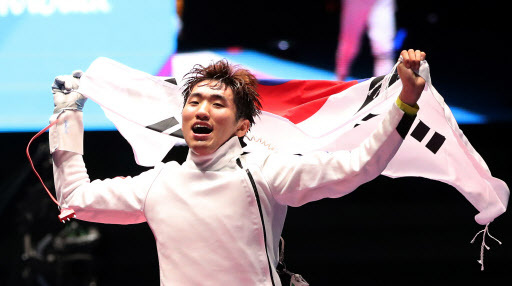At every Olympics, new stars will emerge, while others will fade away. South Korea saw fresh faces step up as heroes at the Rio de Janeiro Games, but former Olympic champions failed to deliver on their promise of medals.

Epee fencer Park Sang-young came out of nowhere to win the men's individual gold. In a memorable final against Geza Imre of Hungary, Park overcame a 14-10 deficit -- one point from defeat -- with under three minutes remaining, scoring five unanswered points for an improbable victory.
Park also became a folk hero back home, when he was captured on camera muttering to himself, "I can do it," when the deficit so late in the bout seemed insurmountable.
At 20, Park also became a source of inspiration for other South Korean athletes. Table tennis player Jeoung Young-sik admitted he thought of Park's rally when he was trailing in his singles match during the men's team bronze medal contest.
Park is a baby-faced, soft-spoken athlete who exudes quiet confidence. On the other end of the spectrum, archer Ku Bon-chan endeared himself to fans not just with his excellence at the range, but with his goofball, down-to-earth image.
The 23-year-old managed to put on a more serious face -- literally -- during his run to the individual gold medal. He survived one-and-done shoot-offs in the quarters and again in the semifinals. After these tense moments, his final victory over Jean-Charles Valladont almost seemed easy.
Nothing came easy for swimmer Park Tae-hwan, though. The 2008 gold medalist in the 400m freestyle made a long, decorated list of South Korean underachievers with past Olympic glory.
Park waged a legal battle against the Korean Olympic Committee over its ban on the swimmer for his doping history. Applying a rule that bans athletes from competing for the country for three years after the end of their doping suspensions, the KOC initially determined Park ineligible for the Rio Games. Park's 18-month suspension over a positive drug test ended in March this year.
Park got the KOC ban lifted just in time to make the national team in early July. In the meantime, he only competed in two meets and failed to impress on either occasion.
The lack of preparation showed in Rio, as he failed to make it out of the heats in the 400m, 200m and 100m freestyle. He then withdrew from the 1,500m free, citing his unpreparedness. Once a national icon, Park became a poster child for futility in Rio.
Fencing was a surprising source of medals for South Korea in London, with two golds, one silver and three bronzes. This year's team featured a handful of medalists from four years ago, but none of them made the podium.
Kim Ji-yeon, the reigning gold medalist in the women's individual sabre, came up well short of medals in both the individual and team competitions this year. Gu Bon-gil, who helped the country to the men's team sabre gold, failed in his attempt to add an individual gold.
Shin A-lam, who famously bounced back from an officiating controversy in the individual event to deliver a team silver four years ago, was shut out in Rio.
In judo, none of the four No. 1-ranked men from South Korea won a gold medal: only two, An Ba-ul in 66kg (silver) and Gwak Dong-han in -90kg (bronze), even won a medal at all.
Lee Yong-dae and Yoo Yeon-seong, the world No. 1 in men's badminton doubles, also didn't get to sniff at a medal, as they lost in the quarterfinals.
After the competition, Yoo announced his retirement from international play. Lee also said he would leave the national team temporarily to compete in a professional league overseas. (Yonhap)


![[Exclusive] Korean military set to ban iPhones over 'security' concerns](http://res.heraldm.com/phpwas/restmb_idxmake.php?idx=644&simg=/content/image/2024/04/23/20240423050599_0.jpg&u=20240423183955)

![[Graphic News] 77% of young Koreans still financially dependent](http://res.heraldm.com/phpwas/restmb_idxmake.php?idx=644&simg=/content/image/2024/04/22/20240422050762_0.gif&u=)



![[Pressure points] Leggings in public: Fashion statement or social faux pas?](http://res.heraldm.com/phpwas/restmb_idxmake.php?idx=644&simg=/content/image/2024/04/23/20240423050669_0.jpg&u=)









